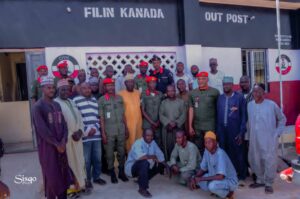Commandant Moriki Hosts New Immigration Chief, Commissions Two New Outposts
By:Abdullahi Inuwa
The Nigeria Security and Civil Defence Corps (NSCDC), Katsina State Command, on Wednesday, 19th November 2025, recorded a significant boost in inter-agency collaboration and grassroots security presence as State Commandant AD Moriki Acti Anim received the new Controller of the Nigeria Immigration Service (NIS), CIS Muhammad Ibrahim, at the Command Headquarters in Katsina.

In a warm welcome, Commandant Moriki reaffirmed the Corps’ unwavering commitment—under the leadership of Professor Ahmed Abubakar Audi, mni, OFR—to safeguarding citizens and protecting critical national assets across the state. He emphasized the long-standing synergy between the NSCDC and the NIS, assuring that the partnership would only grow stronger in addressing emerging security challenges.
Controller Muhammad Ibrahim explained that his visit was aimed at deepening cooperation with the NSCDC, stressing the need for tighter operational alignment between both agencies in Katsina.

In a major development later in the day, Commandant Moriki commissioned two newly constructed security outposts—Jan Bango Outpost and Unguwar KTTV Outpost—describing them as strategic installations designed to push security operations closer to the grassroots. He also inspected the upgraded Filin Kanada Outpost, all within Katsina metropolis.
Commandant Moriki extended profound appreciation to the Katsina State Government under Governor Dikko Umaru Radda, PhD, CON, for creating an enabling environment for security agencies to thrive. He also commended the Chairman of IPMAN and CEO of AA Rahamawa Petroleum, Alhaji Aminu Ahmed Wali, for singlehandedly constructing and donating the Jan Bango facility to the Corps.

He urged residents to remain vigilant and continue supplying credible intelligence to security agencies, while charging deployed personnel to uphold discipline, professionalism, and dedication.
The event drew notable dignitaries, including representatives of the National Assembly, the Katsina State House of Assembly, top government officials, and major stakeholders in the state’s security and petroleum sectors.





